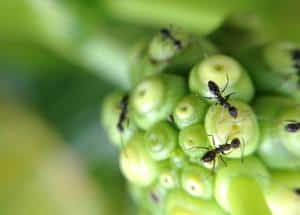If you want to keep your garden insect-free, one of the first questions is how to get rid of ants in the garden safely. No matter if it’s a natural garden or a raised garden bed, ants are ubiquitous. There are methods to keep them at bay, though, both natural and industrial.
How serious are you about eliminating them? Do you want to do it once and forever, or do you just want to minimize the trouble with these insects? Now, decide what you want, and let’s talk about methods.
Guide on How to Get Rid of Ants in the Garden
As you find out there are too many ants on your property causing too much trouble, you may want to drive them away. There are both natural ways to keep them out and industrial chemicals that efficiently extinguish the population.
Both require knowledge and determination.
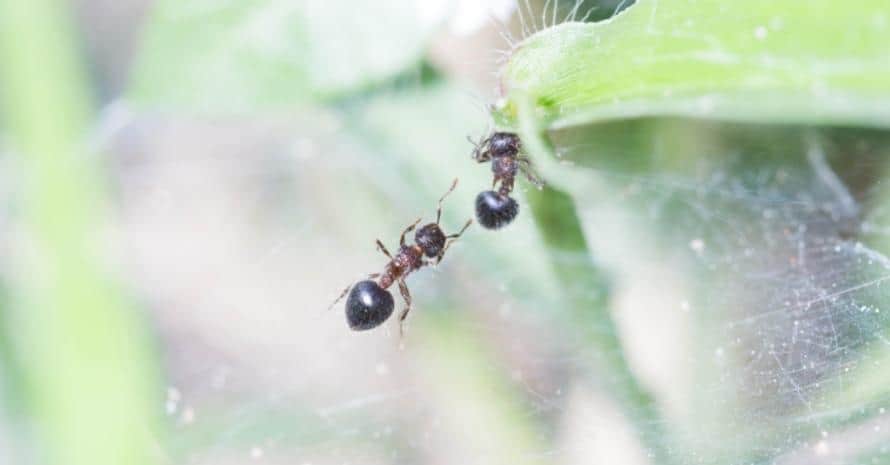
Natural methods are not as final as industrial. Instead of getting completely rid of ants, they rather repel most of them, while some still make it to the area. Yet the negative effects (like finding these insects in your home or finding an anthill in your yard) are smoothened.
In addition, they are harmless for the environment. This cannot be said about professional methods of killing ants in garden: though efficient, they are also dangerous for other living creatures, from bacteria and plants to unprotected humans.
Now, let’s have a deeper insight into these methods.
Natural Methods to Get Rid of Ants
If you are determined to get rid of ants in a garden without insecticides, you need to search among living creatures that repel or eat away these little insects.
Animals and other insects that eat ants make an inventive and spectacular method, but they are harder to control. So excuse me for focusing on plants and household chemicals instead of anteaters, bears, or even hedgehogs. And… where do you keep your shovel?
Plants
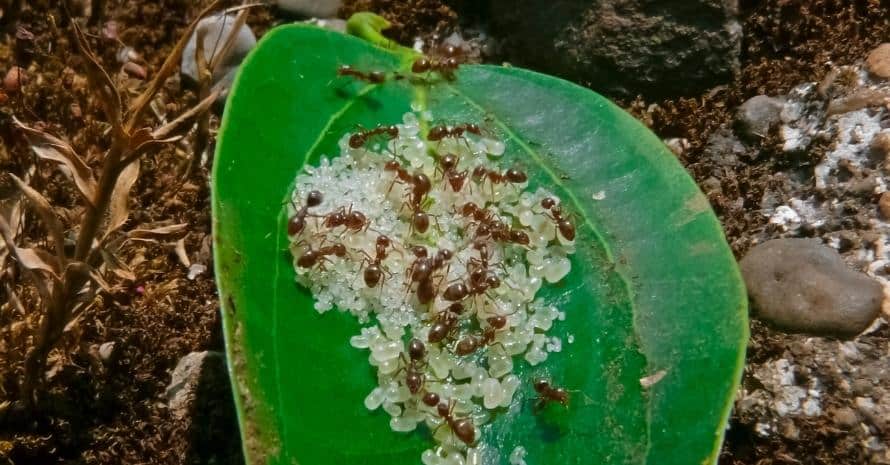
Just planting certain species of plants is a good way of getting rid of ants in the garden. The aroma of these plants can repel ants quite efficiently.
In addition, this plan does not involve potentially harmful chemicals, so if you’re curious about how to get rid of ants in the garden without harming plants, you can just add more plants. Here are your potential protectors:
- Lavender. Not only will it repel the ants, but it also will serve as an eye-candy.
- Rosemary. That’s for remembrance; pray, love, remember. Even if you don’t always recite
- Shakespeare at seeing it, neither do ants: they are too busy running away.
- Catnip. This plant is quite common, but it gets the job done.
- Thyme. For cooking, you better buy some in the store. But as an ant repellent, living thyme works.
- Mint. Having some in your yard is always good: you may just like the smell. It’s because you aren’t an ant.
- Tansy. Its smell is rather specific, but ants dislike it even more.
You can also use plants like garlic. Not that the smell is pleasant (what did you expect from a natural ant repellent for a garden?), and it’s easier to buy some for cooking, but if you use your raised garden beds for, say, microgreens and want to protect them from ants, some microgarlic planted among others will get the job done. Nature has already shown you how to keep ants out of the garden, so you just need to follow.
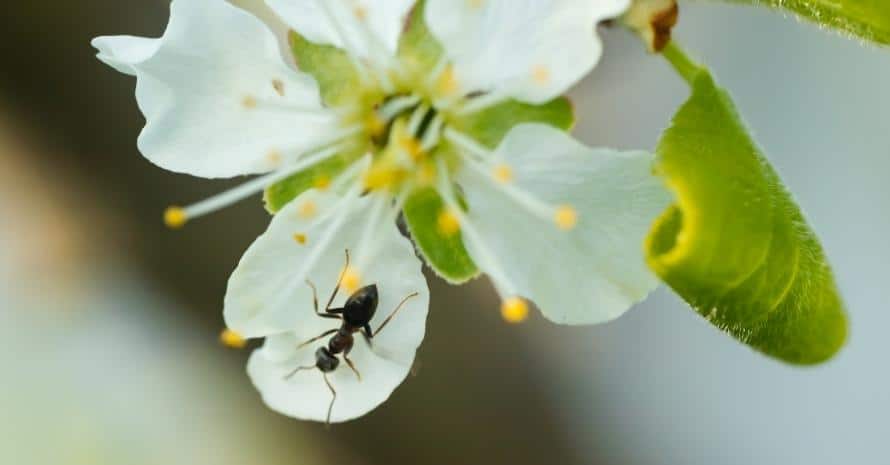
Products and household chemicals
There are many household chemicals we use for cleaning or cooking. But for ants, they may work as mass destruction weapons.
Here is the list of those I’d recommend using on ants if you prefer more radical solutions on how to get rid of ants in the garden.
- Borax is great for garden ant removal. I have written an entire guide on using borax indoors and outdoors. It’s affordable, easy to handle, and its solution is great for poisoning the ant population.
- Simple vinegar also does a great job. Mix it 50/50 with water and process the ant paths. You can also apply it to the borders of the ant-free area.
- Lemon juice. It’s also available in any grocery store, and it doesn’t take much of it. You need to dissolve it in water, 50/50, and apply where the ants live. Soon they will find your tastes in fragrances disgusting and leave.
- Peppermint essential oil will get the job done. And you’ll need just a few drops of it, given its intense aroma.
- Ground cinnamon is a good repellent that will also fill your household with a pleasant aroma (in case you like it).
How much of the repellent should you apply? Rely on your nose. If you can feel the smell, so do the ants. Just don’t do it with a runny nose: it’s too easy to overtry.
In addition, remember that all the products you use, both natural and synthetic, soon wear out, so the procedures need to be repeated.
Physical removal
If you find an anthill on your property, you may think of simply destroying it. It makes sense: while occasional trespassers will not do much harm, an entire colony may harm your plants and trees.
They are also known for their habit of growing aphids which are much more harmful to your trees and plants.
So, having an anthill on your property may be a great impression for a kid, an adult may want to take a shovel and ruin it.
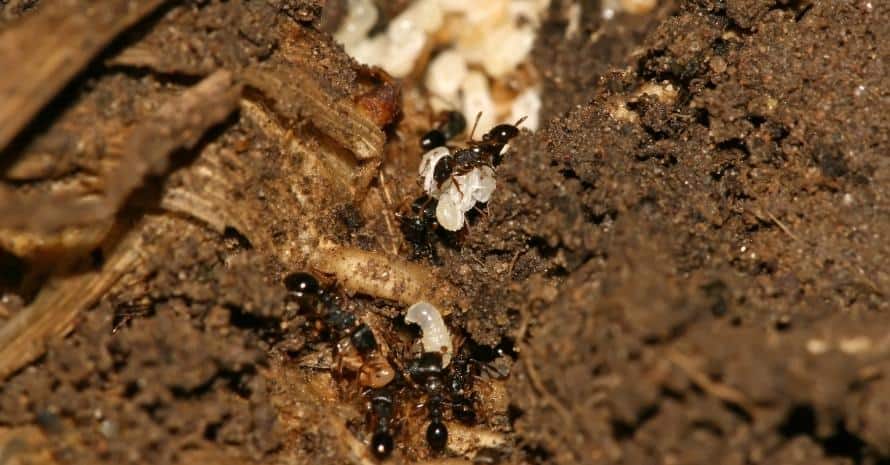
Simply destroying it, though, won’t help. The ants will rebuild it quickly. In addition, they can get aggressive during your invasion and may bite you.
Small as they are, they attack in numbers, and some species may be poisonous. If you do want to remove it, you better do it with a water hose. Not only will water ruin the visible part of it, but it also get to the underground levels that any anthill has.
Also, you better move the anthill instead of simply ruining it. You will need several buckets to move the ants with. You will inevitably lose some of them on the way, but if you move the reproductive members of the colony, they will have to rebuild their home in the new location. So make sure you get them far enough from your property.
Finally, you can just boil the ants alive. Boiling water kills them in large numbers. In addition, it can get where the queen dwells.
Though the water may run a little colder when it finally makes it to the boss level, it will still be hot enough. If you kill the reproductive forces of the ant society, the rest will have to move elsewhere.
Important! Before doing it, make sure this activity is not prohibited by your local laws (though I honestly tried to find whether anthill removal is prohibited and found quite a few mentions of it).
Professional Methods to Get Rid of Ants
All these methods using household liquids and stuff may work fine. Also, they may fail. Then, here come the professionals. Any pest control company has either a special anti-ant plan or general pest control plans that include ants.
Use Professional Baits
Professionals use special gel baits to extinguish ants. As ants eat them, they get slowly poisoned and bring the poison to the nest. There, the killing power of it remains.
As ants die inside the nest (or bring their dead home like some species do), the concentration of poison grows. This eventually leads to the full extermination of the inhabitants.
The problem is that you can’t just buy these baits at Walmart. Not only are they proprietary: their use is strictly regulated by authorities, and professionals using them need licenses.
So, the chance you can get these baits and use them on your own is infinitesimal. In addition, ant baits are not enough: you need some expertise to leave them at the right place and at the right time.
Call the Pros
This is the most efficient way, though – logically – the most expensive. In addition, you will have to set the date and provide them with full access to the area. Also, you may need to leave your property for a while, though with ants, it’s not common.
Maybe (though it depends on the method of garden ant removal), you will have to move away at least your children and pets. Last but not least: the procedures may need to be repeated, because even professionals don’t grant full extinction at once.
FAQ on How to Kill Ants in the Garden
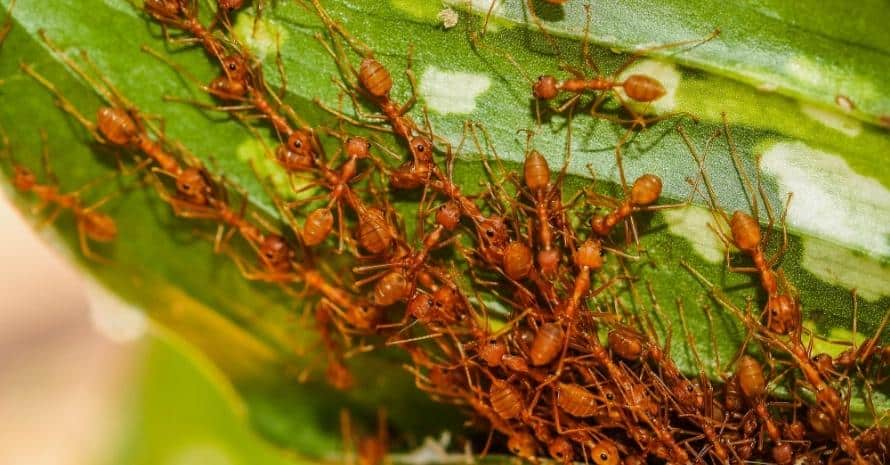
There are some situations I want to address directly. These questions are asked frequently enough for that.
How to get rid of ants in the garden without harming plants?
I would recommend using natural repellents only. One way is to use lemon juice, cinnamon, or other natural substances with a strong aroma that repels ants.
This procedure has to be repeated from time to time. Another is to plant some plants that would repeal the ants constantly. Chemicals are way more dangerous for plants: it applies to both professional baits and household chemicals.
What is the fastest way to get rid of ants outside?
If you need them away from there as quickly as possible, you can apply household chemicals or mixtures of natural acids, like vinegar or lemon juices.
If you dissolve enough of it with water and process your area where you don’t want ants, they will be gone within a day. If you detect the nest, though, you can just come there with a boiling teapot and apply some boiling water.
Why is my garden full of ants?
There is probably a nest nearby. And of all the places they have chosen your garden to visit because there is a lot to eat. No, you cannot just remove that food, even if you hermetically contain all your waste.
They find it right on the soil. To repel them, you need something stronger than just cleaning up your property.
How do I get rid of ants in my raised beds?
There are some solutions that won’t do any harm to your plants but will keep the ants away.
For example, you can mix the soil with coffee grounds (you won’t have enough of these for a real garden, but for a raised one, you may prepare enough with just one run of your coffee grinder). You can also use cinnamon grounds.
Are ants good for your garden?
To some extent, they are. Ants are a part of almost every ecosystem on Earth (except for Arctic and Antarctic zones). Ants utilize dead animals and insects. Ants keep the soil aerated.
The matter is, it doesn’t take an entire colony: regular visitors will do it as well. If you discover a colony in your home, you better do away with it as soon as you can.
No More Ants in the Plants!
After reading this, you may have realized that the WMD you need against ants is right now on a shelf in your kitchen. It doesn’t mean, though, that you should start right now.
First, explore your property, find the spots where you can’t tolerate ants and places where they may be fruitful and multiply. Then consider various plans you find applicable.
After that, start doing what you do: planting plants, mixing vinegar with water, or calling the pros. And I’ll be grateful if you share your experience with me and with other readers in the comments!
Also read:
References
- Do ants bury their dead?(NewScientist)
https://www.newscientist.com/lastword/mg24632841-100-do-ants-bury-their-dead/ - All About Garlic Greens!(Hamama Blog)
https://www.hamama.com/blogs/hamama-blog/all-about-garlic-greens - Quote by William Shakespeare(GoodReads)
https://www.goodreads.com/quotes/602061-there-s-rosemary-that-s-for-remembrance-pray-love-remember-and-there#:~:text=“There’s%20rosemary%2C%20that’s%20for%20remembrance%3B%20pray%2C%20love%2C,herb%20of%20grace%20o’%20Sundays.

